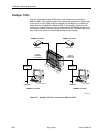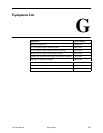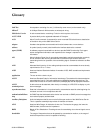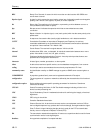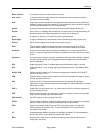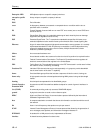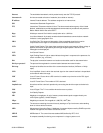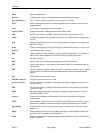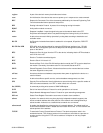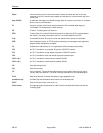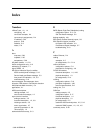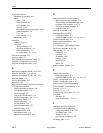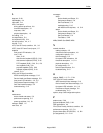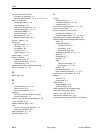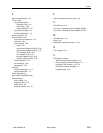
Glossary
GL-6
3162-A2-GB20-40
August 2000
Maximum Request Unit.
A configuration of data processing devices used for information exchange.
The T1 network interface connector on the rear panel of the CSU.
Network Management System. A computer system used for monitoring and controlling
network devices.
A connection or switching point on the network.
A specific item within a Management Information Base (MIB).
Out Of Frame. An error condition in which frame synchronization bits are in error.
A hardware or software function that can be selected or enabled as part of a configuration
process.
Password Authentication Protocol. A security technique that requires a user password for
access to a system.
A way of checking data accuracy by counting the number of bits that have a value of one.
The information bits in a frame.
Private Branch Exchange. Telephone switching equipment dedicated to one customer. A
PBX connects private telephones to each other and to the public dial network.
Personal Computer.
Protocol Data Unit. A message containing protocol-specific information.
Pulse Density Violation. The number of ones (marks, pulses) is not adequate for the line
requirement.
Payload Loopback. Loopback mode that loops the information received on the T1 network
interface back to the network after it has passed through receive and transmit framing
section.
An access point for data entry or exit.
The power input connector on the CSU.
A test that checks most hardware components when power is applied to the device or a
reset is initiated.
Point-to-Point Protocol. A protocol for packet transmission over serial links, specified by
Internet RFC 1661.
Performance Report Messages. Messages indicating the current state of a T1 line as
specified by ANSI-T1-403.
A set of rules that determines the behavior of devices in achieving and maintaining
communication.
Public Switched Telephone Network. A network shared among many users who can use
telephones to establish connections between two points. Also known as dial network.
A measure of the number of ones (marks, pulses) in relation to the total number of bits
transmitted.
Quasi-Random Signal Source. A test pattern simulating a random pattern of digital ones
and zeros used to simulate normal transmission.
Random-Access Memory. Read/write memory that is volatile and loses its contents when
power is removed.
MRU
network
network interface
NMS
node
object (SNMP)
OOF
option
PAP
parity
payload
PBX
PC
PDU
PDV
PLB
port
POWER connector
power-on self-test
PPP
PRM
protocol
PSTN
pulse density
QRSS
RAM



